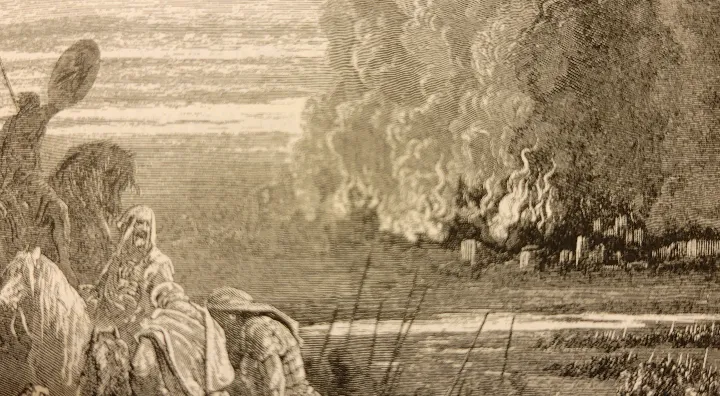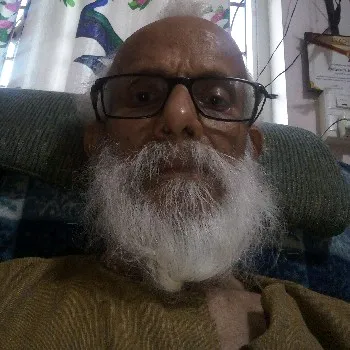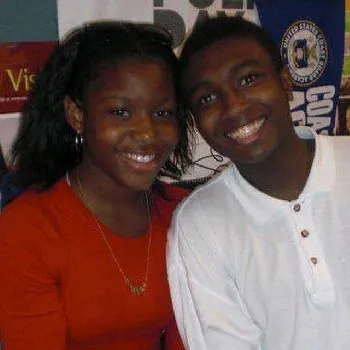Heavenly Kingdoms - Chapter 6
From Margaret Playford to Caroline Playford, 15th of July, 1859.
Dear Cousin,
Such misery! You have no idea! The Charlstons are the most miserable family I have ever witnessed or heard speak of and considering the poverty of our tenants the Fitzwilliams, whose squalid dwelling I have been obliged to visit on all too frequent an occasion, this should say much toward convincing you of the destitution of this poor family I have had the misfortune to stay with for the last fortnight. To further juxtapose, the Fitzwilliams have one scrawny cow, seven half-starved children of which three are always suffering consumption (they had ten, and are soon to have four), and fields half covered in blight, yet their spirits are not half as distraught as that of Anne and that haunted homunculus she calls father.
But such is the typical fate of the highborn; to feel each woe with deeper anguish than the unwashed whose limited faculties are not sufficient to suffer the same depths. My dear George thinks me bigoted but I know he is all talk as I see him wince whenever the low-born speak to him in their coarse tones and jilting lilt. His romantic ways betray him, forcing hypocrisy from his lips, for he is too concerned with beauty to truly think the ugly worth consideration as equals. He writes and speaks only in the angelic. You could imagine then my glee at finding then upon his writing desk one day the play of Cromwell, by that French genius Hugo, wherein it states in the introduction that “it is through the fruitful union of the grotesque and the sublime that modern genius is born”, a statement which I forced him to concede he thought true, yet, by the admission of his own inability to fuse the two proves his lack of genius. Poor fool. Such visions of grandeur – so easily cut down. One day he will be made sensible.
But enough of George for now until he returns later in this grim telling of ”The Horrors of Sedgewood Manor”. Perhaps a memoir should be penned, would that I had sufficient command of the macabre to do justice to what would surely be considered gothic in literary nature. Yet will I relate my stay thus far and you can decide whether the plain truth is sufficient to induce the requisite horror of the author of such a tale.
I arrived on the 5th at Sedgewood to Anne’s anxious admission, torn as she no doubt was between the longing for company and the embarrassment of her situation. To my surprise her father was not stationed at his usual place by the fire. My immediate thought was that he’d been somehow concealed away until we were settled in lest we immediately turn tale and run back home. Perhaps Anne did not realize how ominous this method made the mood; better to get it out of the way than delay, would be my motto; but such is the thinking of those who do not dither.
My room was at least well kept; Mrs Cruikshank is, at least, diligent at the basics housekeeping, although having stayed in this house when I was younger the rooms are somehow much colder than before. But we all know why. That saint, Mrs Charlston, had the touch for bringing light to these rooms – a talent which Anne has yet to develop as hostess. Poor Anne does not think to have the overgrown bowers trimmed to allow light into the room (all the garden is overgrown), nor does she think to leave the vases actually populated with flowers or add any new ornament that may give the impression the house is still alive and not simply the grave of a family, unchanging, six feet below, holding only what they were given in death. You may wonder at my tone, being so unlike myself, but this place has affected me in unexpected ways. Fear not, I am still my irascible self but may lapse occasionally into these reveries during the course of my letter.
Having moved into my room, I was immediately assaulted with an awkward moment to navigate: Anne standing expectantly with hands clasped in front of her as I made surveyance of the grim room and tried to keep a cheer about me. I eventually completed my circumnavigation of the dreary space, eyes having touched the faded floral bedspread, the dresser with its crack-handled brush and that portrait of Bramwell Charlston, the grandfather, mustachioed and severe, unsettlingly placed beside a dog which the artist clearly had no stationary subject to model, before settling my gaze on Anne herself, accompanied by my most practiced smile of satisfaction and awaited her command.
Here was I to witness the sad decline of a family pantomimed over ten seconds. It began with an attempt to ask me if would be comfortable here, I believe that was the case anyway, as she hardly uttered a word before breaking off and after those eternal seconds during which the grieved ponder the futility of normality in a disfigured world she was sobbing upon my chest, blubbering, “oh Maggie, I can’t do it! I just can’t!”
Really all these tears! I patted her tenderly and said the requisite platitudes to stow the flowing stream but it only seemed to grow, eventually compounding into great heaving sobs that not only shook me but surely the very foundations of the already crumbling house.
I had her sit on the bed next to me and eventually she calmed herself down, which, thank god, happened just in time before stone-hearted yours truly would have started to howl in unison.
It was here I was able to interject my first statement with any substance as, as you know, I am pragmatic when possible and all this blubbering never got anyone anywhere useful.
I said to Anne, “My poor dear, what could possibly have happened to distress you so? Surely not all is so bad? You seem of decent health yourself. I know your dear sweet mother is no longer here but her spirit has surely watched over you these last four years. And your father… frankly he is what he is; he is what he made himself to be. All you can do is close your ears to his chides and serve his basic needs (although surely Mrs Cruikshank could do as much without you needing to sully yourself with such thankless labor)”.
As I spoke I could see that my words had little effect as she was suffering that pernicious melancholy, the kind that wishes for no cure but revels in anguish, until a small spark of indignation rose to counter the helpless despair. It seems I rankled her pride, or that of her father, by suggesting that he was too far gone for a daughter to nurse back to some semblance of health. I know this had been her brother Richard’s view, and the two had perhaps fallen out because of it, but here I fell on Richard’s side as the man knows how to talk sense (unlike my poor George or this pitiable creature Anne).
Regardless, I’d take indignation, anger, rage, a veritable choleric disposition over the waterworks I’d just been subjected to, so I treated her sudden reddening as a boon. Her words which accompanied the indignation amused me, however, for their incongruity.
She said, “No. I can do it.”
Now here I couldn’t resist saying, “But darling, you just told me you can’t, not five minutes ago.”
“I was emotional. It has passed.”
“Perhaps, but how often are you overwhelmed?”
She did not answer.
I plunged on, “Be reasonable my dear, you have done all that could be expected. No one can fault you for lacking love and commitment to your father; you have nothing to prove.”
“I do to mother. And to God.”
“Your mother would be the first to understand. As for God he cares primarily of your devotion to Him.”
“I do not think so. Their gaze shames me. I am a shameful servant and prodigal daughter.”
“You do not listen,” I said gently, “your mind is wrapped in the hubris of melancholy – sure signs of a wish for martyrdom. I see you. You are good but know not how to act out your goodness, crippled as you are by shame, guilt, excess of empathy and – who knows what else – all your best, most noble parts conspire against you. Think on how the disinterest of Mrs Cruikshank allows her to better perform the duty of carer.”
“It is not to care but to cure that I have tasked myself.” It was well said but her tone was weakening.
I pushed on, perhaps cruelly, “Are you practicing then, Dr Charlston?”
“This is a daughter’s work not a doctor’s.”
“Oh I see – all can be resolved through the right application of love, is that it? All that a doctor knows of the humors and the mind are worthless beside the knowhow of the heart?”
Again she did not answer but stewed under my insufferable rhetoric.
Perhaps I should break from my retelling of this conversation and give some context of the challenge Mr Charlston presents to a designated carer, given that it occurs to me that you have not yet witnessed his extreme bitterness or heard tale of it outside of slim rumor. But alas, I have run out of time, and must send what I have before the mail boy is out of reach for the day. I will write you again tomorrow.
With love,
Maggie
Dear Cousin,
Such misery! You have no idea! The Charlstons are the most miserable family I have ever witnessed or heard speak of and considering the poverty of our tenants the Fitzwilliams, whose squalid dwelling I have been obliged to visit on all too frequent an occasion, this should say much toward convincing you of the destitution of this poor family I have had the misfortune to stay with for the last fortnight. To further juxtapose, the Fitzwilliams have one scrawny cow, seven half-starved children of which three are always suffering consumption (they had ten, and are soon to have four), and fields half covered in blight, yet their spirits are not half as distraught as that of Anne and that haunted homunculus she calls father.
But such is the typical fate of the highborn; to feel each woe with deeper anguish than the unwashed whose limited faculties are not sufficient to suffer the same depths. My dear George thinks me bigoted but I know he is all talk as I see him wince whenever the low-born speak to him in their coarse tones and jilting lilt. His romantic ways betray him, forcing hypocrisy from his lips, for he is too concerned with beauty to truly think the ugly worth consideration as equals. He writes and speaks only in the angelic. You could imagine then my glee at finding then upon his writing desk one day the play of Cromwell, by that French genius Hugo, wherein it states in the introduction that “it is through the fruitful union of the grotesque and the sublime that modern genius is born”, a statement which I forced him to concede he thought true, yet, by the admission of his own inability to fuse the two proves his lack of genius. Poor fool. Such visions of grandeur – so easily cut down. One day he will be made sensible.
But enough of George for now until he returns later in this grim telling of ”The Horrors of Sedgewood Manor”. Perhaps a memoir should be penned, would that I had sufficient command of the macabre to do justice to what would surely be considered gothic in literary nature. Yet will I relate my stay thus far and you can decide whether the plain truth is sufficient to induce the requisite horror of the author of such a tale.
I arrived on the 5th at Sedgewood to Anne’s anxious admission, torn as she no doubt was between the longing for company and the embarrassment of her situation. To my surprise her father was not stationed at his usual place by the fire. My immediate thought was that he’d been somehow concealed away until we were settled in lest we immediately turn tale and run back home. Perhaps Anne did not realize how ominous this method made the mood; better to get it out of the way than delay, would be my motto; but such is the thinking of those who do not dither.
My room was at least well kept; Mrs Cruikshank is, at least, diligent at the basics housekeeping, although having stayed in this house when I was younger the rooms are somehow much colder than before. But we all know why. That saint, Mrs Charlston, had the touch for bringing light to these rooms – a talent which Anne has yet to develop as hostess. Poor Anne does not think to have the overgrown bowers trimmed to allow light into the room (all the garden is overgrown), nor does she think to leave the vases actually populated with flowers or add any new ornament that may give the impression the house is still alive and not simply the grave of a family, unchanging, six feet below, holding only what they were given in death. You may wonder at my tone, being so unlike myself, but this place has affected me in unexpected ways. Fear not, I am still my irascible self but may lapse occasionally into these reveries during the course of my letter.
Having moved into my room, I was immediately assaulted with an awkward moment to navigate: Anne standing expectantly with hands clasped in front of her as I made surveyance of the grim room and tried to keep a cheer about me. I eventually completed my circumnavigation of the dreary space, eyes having touched the faded floral bedspread, the dresser with its crack-handled brush and that portrait of Bramwell Charlston, the grandfather, mustachioed and severe, unsettlingly placed beside a dog which the artist clearly had no stationary subject to model, before settling my gaze on Anne herself, accompanied by my most practiced smile of satisfaction and awaited her command.
Here was I to witness the sad decline of a family pantomimed over ten seconds. It began with an attempt to ask me if would be comfortable here, I believe that was the case anyway, as she hardly uttered a word before breaking off and after those eternal seconds during which the grieved ponder the futility of normality in a disfigured world she was sobbing upon my chest, blubbering, “oh Maggie, I can’t do it! I just can’t!”
Really all these tears! I patted her tenderly and said the requisite platitudes to stow the flowing stream but it only seemed to grow, eventually compounding into great heaving sobs that not only shook me but surely the very foundations of the already crumbling house.
I had her sit on the bed next to me and eventually she calmed herself down, which, thank god, happened just in time before stone-hearted yours truly would have started to howl in unison.
It was here I was able to interject my first statement with any substance as, as you know, I am pragmatic when possible and all this blubbering never got anyone anywhere useful.
I said to Anne, “My poor dear, what could possibly have happened to distress you so? Surely not all is so bad? You seem of decent health yourself. I know your dear sweet mother is no longer here but her spirit has surely watched over you these last four years. And your father… frankly he is what he is; he is what he made himself to be. All you can do is close your ears to his chides and serve his basic needs (although surely Mrs Cruikshank could do as much without you needing to sully yourself with such thankless labor)”.
As I spoke I could see that my words had little effect as she was suffering that pernicious melancholy, the kind that wishes for no cure but revels in anguish, until a small spark of indignation rose to counter the helpless despair. It seems I rankled her pride, or that of her father, by suggesting that he was too far gone for a daughter to nurse back to some semblance of health. I know this had been her brother Richard’s view, and the two had perhaps fallen out because of it, but here I fell on Richard’s side as the man knows how to talk sense (unlike my poor George or this pitiable creature Anne).
Regardless, I’d take indignation, anger, rage, a veritable choleric disposition over the waterworks I’d just been subjected to, so I treated her sudden reddening as a boon. Her words which accompanied the indignation amused me, however, for their incongruity.
She said, “No. I can do it.”
Now here I couldn’t resist saying, “But darling, you just told me you can’t, not five minutes ago.”
“I was emotional. It has passed.”
“Perhaps, but how often are you overwhelmed?”
She did not answer.
I plunged on, “Be reasonable my dear, you have done all that could be expected. No one can fault you for lacking love and commitment to your father; you have nothing to prove.”
“I do to mother. And to God.”
“Your mother would be the first to understand. As for God he cares primarily of your devotion to Him.”
“I do not think so. Their gaze shames me. I am a shameful servant and prodigal daughter.”
“You do not listen,” I said gently, “your mind is wrapped in the hubris of melancholy – sure signs of a wish for martyrdom. I see you. You are good but know not how to act out your goodness, crippled as you are by shame, guilt, excess of empathy and – who knows what else – all your best, most noble parts conspire against you. Think on how the disinterest of Mrs Cruikshank allows her to better perform the duty of carer.”
“It is not to care but to cure that I have tasked myself.” It was well said but her tone was weakening.
I pushed on, perhaps cruelly, “Are you practicing then, Dr Charlston?”
“This is a daughter’s work not a doctor’s.”
“Oh I see – all can be resolved through the right application of love, is that it? All that a doctor knows of the humors and the mind are worthless beside the knowhow of the heart?”
Again she did not answer but stewed under my insufferable rhetoric.
Perhaps I should break from my retelling of this conversation and give some context of the challenge Mr Charlston presents to a designated carer, given that it occurs to me that you have not yet witnessed his extreme bitterness or heard tale of it outside of slim rumor. But alas, I have run out of time, and must send what I have before the mail boy is out of reach for the day. I will write you again tomorrow.
With love,
Maggie
Related Stories














